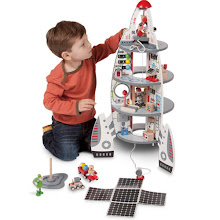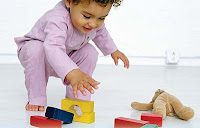
A child's self-esteem is like a flower, and just like a flower it must be nurtured, given nutrients and kept safe in order for it to blossom. It is so important that we as parents ensure that we help our children have a high self-esteem in order to help our children succeed in this very competitive world.
I am very conscious of ensuring that my young daughter has a strong positive self-esteem because I want her to always know that she is someone who is special, loved, and capable of achieving anything she sets her mind to.
The following article written by Cassie
Simons, author of 'How to Help You Child Succeed' touches on this issue and I believe provides important information on how we can help our children.
Give Your Child the Gift of Self-EsteemBy Cassie Simons Much has been said about the "gifted child" but in truth every child is born with unlimited potential. As expressed so well by Orison Marden:
"Deep within man dwell those slumbering powers; powers that would astonish him, that he never dreamed of possessing; forces that would revolutionize his life if aroused and put into action."
This statement can be true for your child. Not just if he's a "gifted child" but any child. Indeed, perhaps we should consider a "gifted child" to be a child whose parents have gifted him with a high self-esteem.
Children with high self-esteem are happier and more successful. Low self-esteem is common in children who are performing badly at school, have behavioural problems and suffer from depression.
The Newborn
The "helpless" newborn baby actually comes into the world well equipped with the power to get what she wants. Not only do her cries bring her parents running to tend to her; she also uses her body and facial language to get what she wants. It's no coincidence that babies learn to smile while they are still very small - it is an essential tool in their armoury of communication. A baby with a disarming smile can frequently wrap mommy or daddy round her little finger!
At this early stage, it's important to respond to all your baby attempts at communication. Attend to her when she cries (this does not preclude training her gently into a stable routine), mirror her attempts at facial communication and reward the infant sounds she makes by praising her and talking back to her.
The "Can-Do" Toddler
Toddlers are into everything! They are learning so fast about the world around them and want to explore everything, touch everything and even try to eat many things.
It is such a crucial stage and one that is stifled by many parents. Yes, you need to control your child's behavior so that he doesn't hurt himself or damage valuable property. But you also need to give him opportunities to express this exploratory behavior without constant criticism and telling-offs.
Put valuables out of reach and supply your child with toys or household items that he can play with safely. Try to find time to get down on the floor and play with your toddler. Let him watch you and imitate you. He could play on the kitchen floor with some pots and wooden spoons while you are cooking.
Discipline
I want to emphasize up front that I believe discipline is very important, because I don't want you to think in any of what follows that I'm advocating spoiling your child. Some parents call this "allowing the child to enjoy the freedom of youth." These parents are entitled, of course, to raise their children however they wish.
But if you want your child to grow into a successful adult, you would do better by teaching her firmly what is and isn't acceptable in present day society. And, just as importantly, helping her to learn self-discipline and that you will support her in achieving anything she wants, as long as she does so ethically.
Discipline should be sensitive, thoughtful and appropriate. You should strive to never lose your temper but to discipline your child calmly and firmly. When is discipline appropriate? When your child's actions (or lack of them) may harm herself or others. When is discipline not appropriate? When it is purely for the parent's own selfish preferences.
Talk to Your Child
Positive talk with your child and generally within the household cannot be over-emphasized. Avoid criticism wherever possible; it is praise that produces good, successful behavior. Be sure to find at least one thing to praise in your child every day. Even better, give praise as often as possible.
Are you having problems finding good behaviors to praise? If so, give your child a task to do that you know he is capable of. Children love earning their parents' approval. Also remember to praise your child for trying, on those occasions that he is not successful.
Set a good example; talk about your goals and successes, and teach your child by example to accept compliments gracefully. Resist the temptation to put yourself down when you are complimented - instead, say a simple Thank You. That's an important sign of a healthy self-esteem.
The other side of the coin to talking is, of course, listening. It is very important to listen to your child. When there is something he is upset about, don't sweep it under the carpet by saying "Don't be silly!" Whatever it is might seem totally trivial to you but often all your child needs is for you to empathise. "I'm sorry you feel sad about that." He may then come up with a solution, or put the incident behind him without further help. Or, you can suggest a solution.
The Power of Desire
You can give your child the best possible schooling, teach all the important techniques of success, encourage goal setting and set a fantastic example. But that is not enough! All these good things have one vitally important pre-requisite. Before you can achieve anything, you must know what you really, really want.
A burning desire is the first, most important and essential step towards any major achievement. As a parent, you are in a unique position to influence another person's desires - your child's. By the time they reach their teens, you will have lost this influence to a significant degree, as young adults are swayed much more by their peers' opinions than their parents'.
So make the most of the early years by instilling positive, beneficial desires in your children. The desire to do well academically could shape your child's further education and career much more than her innate ability.
How can you instill desire? Telling stories is a great way. Children love stories! Be creative and tell stories where the hero or heroine has a burning desire for something, overcomes challenges and set backs, and achieves the desired outcome. Try telling stories where a child achieves academic success, which in turn results in something even more desirable. For instance, one story could tell of a child who has a burning desire to travel to the North Pole. She succeeds academically and thus wins an award, which makes her dream come true. Tailor the stories to your own child's life and experiences as much as you can.
The famous author Napoleon Hill used story-telling to instill in his almost-deaf son both a burning desire to hear, and a firm belief that his disability would actually bestow upon him a great advantage (although at the time even his father had no idea what that advantage could be). By the time this boy left college, he had against the odds acquired a hearing aid that enabled him to hear clearly for the first time in his life. More remarkably, he had justified his father's belief by securing a marketing position with the hearing aid manufacturer to bring the same benefit to millions of other deafened people.
"Gifted child"? Give your child the gift of self-esteem, and you will give him the gift of happiness.
Cassie Simons (cassie@kidsgoals.com) is the author of "How to Help Your Child Succeed", a revolutionary approach to guilt-free parenting. Positive Parenting, Gifted Child - Visit www.KidsGoals.com today for the secrets of raising successful children.
It is just incredible how important a child's early years are for their development. Parents have a great deal of responsibility, it is very important for us to ensure that we watch how we communicate, discipline and act with our young children. This responsibility is something that we must not take lightly as it can have such far-reaching effects.
 My daughter's favourite time at her day care is sensory time, she absolutely loves getting her hands full of paint, glitter, goop, and playdough. In fact she likes everything about arts and crafts. We went through a period when every time I would pick her up she would be wearing her change of clothes and still be full of paint. Her teacher told me that she liked to become one with the paint and they just could not stop her. Now she has to be changed into her arts and craft 'outfit' so that she does not dirty all her clothes.
My daughter's favourite time at her day care is sensory time, she absolutely loves getting her hands full of paint, glitter, goop, and playdough. In fact she likes everything about arts and crafts. We went through a period when every time I would pick her up she would be wearing her change of clothes and still be full of paint. Her teacher told me that she liked to become one with the paint and they just could not stop her. Now she has to be changed into her arts and craft 'outfit' so that she does not dirty all her clothes.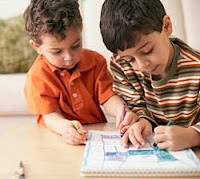 - You can make just about anything you can think off out of corrugated boxes. You can make a sail boat, a car, a stove, a robot, or anything your imagination or their imagination can think off.
- You can make just about anything you can think off out of corrugated boxes. You can make a sail boat, a car, a stove, a robot, or anything your imagination or their imagination can think off.

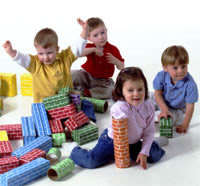

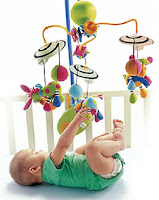 If you are in search of a mobile for your little one, look no further than Tiny Love's Symphony-In-Motion-Farmyard Animals mobile. Great features of this mobile include captivating music from Bach, Mozart and Beethoven which will help develop baby's sense of hearing. It also has 4 different types of movement and motion that will capture baby's attention and encourage them to follow along. As the child grows they will learn about cause and effect each time they press the buttons on the base of the mobile and music plays. This mobile is a beautiful addition to any nursery.
If you are in search of a mobile for your little one, look no further than Tiny Love's Symphony-In-Motion-Farmyard Animals mobile. Great features of this mobile include captivating music from Bach, Mozart and Beethoven which will help develop baby's sense of hearing. It also has 4 different types of movement and motion that will capture baby's attention and encourage them to follow along. As the child grows they will learn about cause and effect each time they press the buttons on the base of the mobile and music plays. This mobile is a beautiful addition to any nursery. The Developlay Activity Center is another exiting toy that will be played with over and over again. The activity center has two sides with each side having age appropriate activities that are designed for different aspects of baby's development. This toy will have baby pulling, pushing, grasping, spinning, looking, listening and laughing at all the interesting things offered by the Developlay Activity Center. A great toy that will stimulate baby's senses, encourage the development of their fine motor skills and cognitive development.
The Developlay Activity Center is another exiting toy that will be played with over and over again. The activity center has two sides with each side having age appropriate activities that are designed for different aspects of baby's development. This toy will have baby pulling, pushing, grasping, spinning, looking, listening and laughing at all the interesting things offered by the Developlay Activity Center. A great toy that will stimulate baby's senses, encourage the development of their fine motor skills and cognitive development.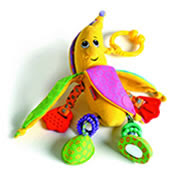 For fun play on the go, the Fruity Pals are a great choice. There is Andy Apple and Anna Banana, with both having hidden surprises that will help
For fun play on the go, the Fruity Pals are a great choice. There is Andy Apple and Anna Banana, with both having hidden surprises that will help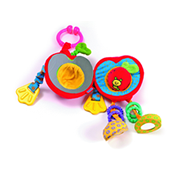 baby develop their sensory and fine motor skills. The Fruity Pals offer a full sensory experience with their bold colours and lovable faces. Along with their fruit-like figures and human characteristics such as mouth, feet and arms they will encourage baby to be creative, imaginative and play.
baby develop their sensory and fine motor skills. The Fruity Pals offer a full sensory experience with their bold colours and lovable faces. Along with their fruit-like figures and human characteristics such as mouth, feet and arms they will encourage baby to be creative, imaginative and play.